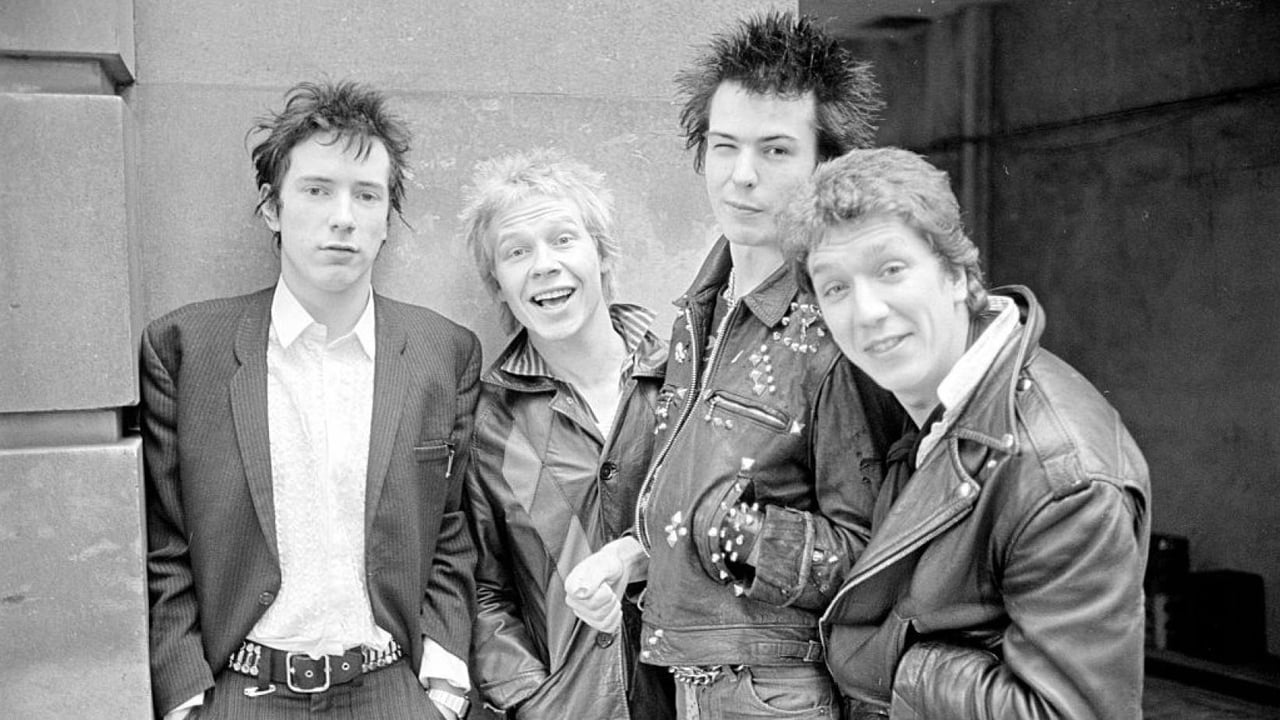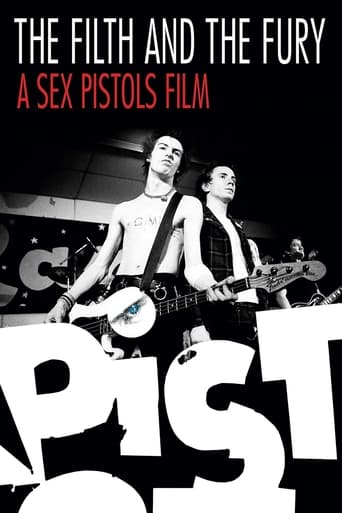

Julien Temple's film about the rise and fall of the Sex Pistols. The title comes from a Daily Mirror headline. It has interviews with the principals but he only shows them in silhouette. It paints an image of the times by using old TV shows. There is plenty of old footage of the band. It is vivid in expressing the guys' view of the times. I'm not a fanatic of the band and cannot vouch for the accuracy. I don't think that matters because it's their telling of their own story. I do have a problem with the silhouetting. It distances their present day self from their story. Temple is trying something artistic but it's unnecessary. Overall, this is a good documentary for fans of the band or anybody interested in this era.
... View MoreThe Filth and the Fury is directed by Julien Temple and is a rockumentary charting the rise and fall of Punk Rock flag bearers, The Sex Pistols. 20 years earlier Temple had made The Great Rock and Roll Swindle, a bonkers and quirky movie that skewed the Sex Pistols legend as some elaborate hoax formulated by band manager Malcolm McLaren. The Filth and the Fury tells the story from the viewpoint of the band members themselves and goes some way to dispelling the myths that surround them and their self publicising manager. The title of the film is a reference to a headline that appeared in the British tabloid newspaper The Daily Mirror after an interview with the band on ITV's Today show presented by Bill Grundy. The story follows the band members from their humble beginnings in London's Shepherd's Bush, to their implosion at the Winterland Ballroom in San Francisco, and then to coup de grace as Sid Vicious & Nancy Spungen left the mortal coil.Love them or hate them, The Sex Pistols in the mid to late 70s created a wave in the music industry that can still be felt today. Most of it now seems tame of course, swearing on TV and alleged distasteful songs are common practice these days, but it were not the case back when flared trousers and guys wearing make up gave way to Punk Rock Britannia. But is there anything here for those who just don't get that the Pistols were influential and one of Britain's most important bands? Yes, definitely. This is no rose tinted glasses documentary serving only to keep the Pistols name on the high heat. Nor, is it over an hour and half of their videos and live footage. Of course the music features prominently, but it's in context to the story, a story that sees the remaining band members give frank and honest assessments of the time, the place and the now.Interviewing the band singularly in darkened silhouette to give off the impression we are witnessing criminal informers at work, Temple also puts the band into historical context with Britain's social situation in the 1970s. This is crucial to the origins of the band. It was a time of strikes and suspect politicians, so with archival footage from the period, Temple fuses the Pistols ire with that of a country that was limping along in apathy. Haters of the band don't want to agree of course, but the Pistols showed that not all of Britain would surrender meekly, and, that music could actually make a difference and shake up the system. "Get Off Your Arse" snarled John, and thousands did, as Punk bands formed over night and showed that the youth of the day had a voice. How many bands can say that eh?But as we know, it was to be a short lived journey for the band, one that would end in tragedy: as first the press went bazooka over the top with their every move, and then as one out of his depth bass player lost sight of the bands vision. This part of the film is subtly handled by Temple, the sense of impending doom hangs heavy, none more so with the old interviews held with Vicious that are woven into the last third as self destruction grows ever near. These sequences show what many people either forget or don't realise; that Vicious was just a kid of 21 years of age. This part of the tale also lets us into an untapped part of Lydon's {ne:Rotten} emotional side, a telling moment that brings the sorry chapter to a close.From a time when music could be as dangerous as the politicians running the country, The Filth & The Fury is an essential music based movie. Not just for fans of the band, nor just for curious music fans in general, but also for historians wishing to see just how bad late 1970s Britain was. 10/10
... View MoreThe Sex Pistols were one of the most underrated bands ever; just listen to the driving guitar of Steve Jones, the wailing dynamic voice of Johnny Rotten and the drums of Paul Cooke driving the rhythm with Glen Matlock on the bass; yes Glen Matlock on the bass and not Sid Vicious; Sid came later and couldn't play the bass, by all accounts, thus giving the band its reputation of incompetence which they didn't deserve; so they only used three chords; so what; so did some of the rock'n'roll greats of the fifties and so did The Ramones.I am not of the same age as The Sex Pistols, I identify more with the likes of Eddie Cochran and Buddy Holly, but I sure envied the fans in the 100 club shown in this movie when they witnessed The Sex Pistols there on Oxford Street with Sid in the audience inventing his pogo dance.In this film we get an early glimpse of their Svengali, Malcolm McLaren, at the store SEX that he owned with his then wife Vivienne Westwood; we see him as he swans around the shop like Sean O'Casey's strutting peacock, wearing a teddy-boy suit and sporting a duck's arse hair cut; here was the opportunist who was to take The Sex Pistols to the top and leave them there; high and almost dry in America with no money, no access to credit and no communication as he refused to take or return any of their calls; McLaren was booked into a luxury hotel whilst the band had to make do with some motel.The Pistols response to this was to tell the audience that they were getting 'one song and one song only as this isn't fun;' Johnny Rotten called on his alter ego John Lydon to relay that pathetic statement to the American crowd; this didn't seem to be the type of crowd that cut Sid's face that night with a missile earlier in an American performance; this was a crowd that took notice when they heard that it wasn't fun any more; it was then that we heard the voice over of Steve Jones saying that he had looked at Sid trying to play a bass, that he wasn't sure was plugged in, and wondered if he wanted to go ahead being a Pistol; he said he left soon after that but had regretted it ever since; he loved performing and loved the sex it had brought him throughout the touring life of The Sex Pistols.Interviews with the members of the band were carried out in silhouette throughout and it became clear that the band trusted the man doing the interviews; one Julien Temple the director of this film who knew the band from his previous movie 'The Great Rock 'n' Roll Swindle' which he had made twenty years prior to this one.Even though it had been twenty one years since the death of the twenty two year old Sid Vicious, the telling of the story brought a tear to Johnny Rotten's eye as it is quite clear that John Ritchie, or John Beverly, or whatever Sid's real name was, was the biggest victim in the whole Sex Pistols story; he was one of the Johns who had always been a friend of the other John the John they changed to Johnny Rotten.There is a lot of archive footage in the film and a lot of it is entertaining; we do see the situation as it was in Britain during the seventies which led up to the famous 'winter of discontent' and we even see the man himself, Laurence Olivier, uttering those famous Shakespearian lines from his own movie 'Richard III' from whence the newspaper sub-editors stole the quote; we see political Britain and racist xenophobic Britain but we also see very funny Britain; there is footage from some of the funniest men of the day: where else can we see archive footage of Nat Jackley, Tommy Cooper, Max Wall, Billy Dainty and even Arthur Askey who was as funny as toothache? There is the infamous television interview with Bill Grundy who, we are told by Steve in voice over, was drunk too we weren't there but it was a terrible interview and the poor fellow deserved to be fired which came soon after that day in 1976.I didn't have anything to do with these people as there was another CS on the scene in London who owned a club and knew Julien Temple but I remember them from afar as their music was as exciting as the first time people of my age had heard Jerry Lee Lewis and Little Richard; it was a terrible shock when they went away and Elvis started to sing ballads but bands like the Pistols hit the dust too when it stopped being fun.
... View Moreif your not a pistols fan before you watch this, you definalty will be after. at least thats the experience I've had from myself and people i know viewing this film. i was already a bit of a fan. you know i had a thing for sid pre nancy days and i thought johnny rotten was a unique man. but after watching this documentary with my dad ( who is a musician, but never liked anything the pistols did) i realized that this band, was so much more than the punks they were made out to be, they were rebeling against being a product of their surroundings, but at the same time find that it near impossible to achieve. my dad on the other hand, watched the movie, and immediately asked for one of my pistols cd. so i game him never mind the bollocks and set off to listen. the very next day, i find him singing 'anarchy' while doing the dishes. his views were exactly hte same as mine. except this documentary turned him from a non believe to a fan.I'm not really one for documentaries... i thought id cracked it when i watched spinal tap, and then realsied that they were only mocking hte whole genre... so then i felt like a fool (but immediately went to see if my dads marshall went up to 11 rather than just 10). but the filth and the fury held my attention from the very first shot to the rolling of the credits. so naturally when i saw it in the store, i bought it, and I've watched it A lot of times since. sometimes in the row... and every time, it makes me laugh, and cry and makes me want to have lived back in the days of the punk.the filth and the fury is an emotional ride of a doco that combines everything you want in a movie with an awesome soundtrack and some real meaning. this documentary is a MUST for all music fans, whether you think you like the pistols or not. by the end of it, you will be converted. or just appreciative. its an excellent piece of film making that tells the story of one of the most influential bands of the 70's, and indeed of rock history.
... View More